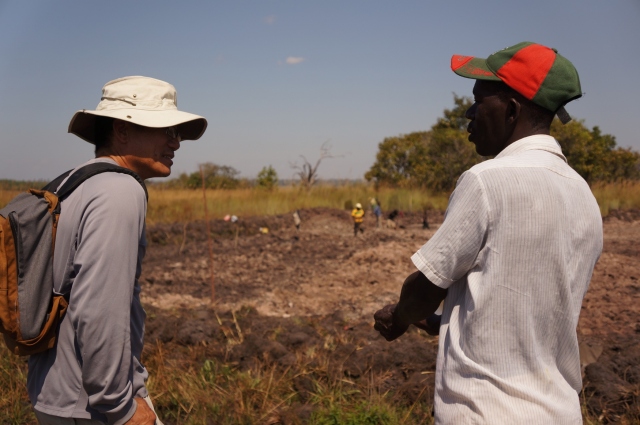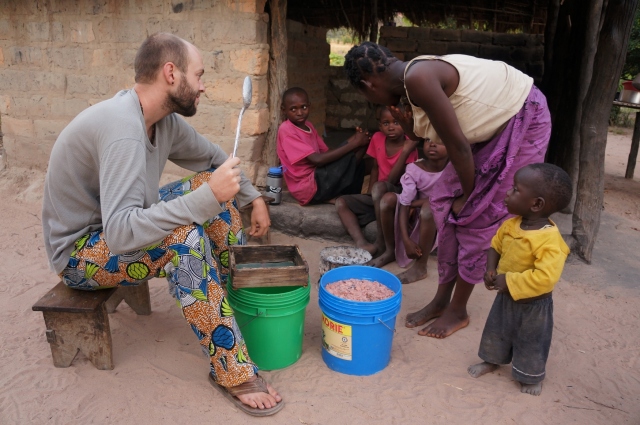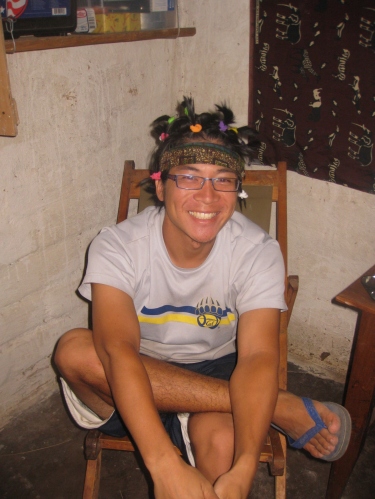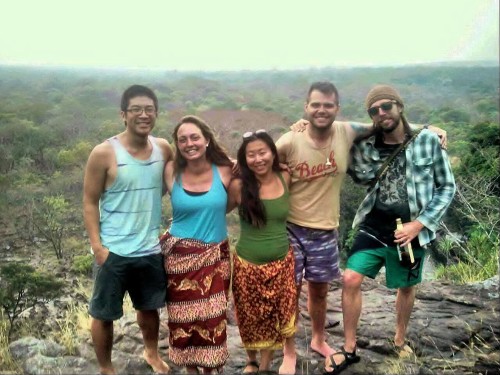You will earn more respect and be more well-liked if you approach people asking what you can learn rather than telling them what you can teach.
A lot of people think that the purpose of Peace Corps volunteers is to bring knowledge to their host countries and communities. Heck, a lot of Peace Corps volunteers think that the purpose of Peace Corps volunteers is to bring knowledge to their host countries and communities. It’s the classic development paradigm: the magnanimous benefactor with education and resources comes to teach, train, or donate to the lucky recipient, whose job it is to learn, develop, and be grateful.
And okay, yes, this is partly what we as volunteers do. But I’ve found that since arriving in Zambia, I’ve asked exponentially more questions than I’ve answered. And I have discovered that, to my surprise, people are more than happy to answer my plethora of questions about everything from school fees to witchcraft to land ownership to how to make village beer. Not a day goes by in which I haven’t asked a question or ten about something related to Zambia, its culture, or its people. I might teach a few farmers a few things, but in the process I am learning so many more things myself.
I worried at first that my curiosity would undermine the authority I was perceived to have as a person who’s ostensibly here to bring knowledge. But in fact, it seems like I’m actually earning more respect this way, as well as making a few new friends in the process. By showing genuine interest in the lives of people in my community, I’ve unwittingly stumbled across the first and most important rule for winning friends and influencing people. Dale Carnegie would be proud.
—
What you do or don’t do has little influence on what other people think about you, so it’s futile to waste time placing too much value on their opinions.
I’ve struggled my entire life with caring too much about what others think of me. For a long time, I subscribed to the belief that if other people thought I was successful, then I was successful. If other people thought I was smart, then I was smart. If other people thought I was attractive, then I was attractive. It’s an easy measuring stick because we’re already very acutely aware of where we stand relative to everyone else around us — if our coworkers and friends don’t tell us how we should look and dress and act and where we should go on weekends, then our cousins or mothers or girlfriends might, and Instagram definitely will. But all this does is perpetuate a society full of conformists, each member taking her cue for how to behave from the people closest to her.
And after moving to rural Zambia, I found myself caring even more what people thought of me. I wanted to be a good volunteer, a responsible ambassador to America, and a respectable member of my community, so I looked to the people around me for affirmation that I was on the right track. Only after many conversations with volunteers farther into their service, along with good ol’ first-hand experience, did I realize that people would form their own opinions of me based on their own criteria no matter how hard I tried to cultivate a consistent image of who I was and what I was doing here. No matter how adept I become at speaking the local language (and in my case the answer is “not very”), after I leave there will still be a good deal of people who will claim that I hadn’t known a lick of Bemba, in direct contradiction to those who will stubbornly, while lying through their teeth, insist that I was fluent.
People will think what they want to think, and they will remember what they want to remember. No matter what I do, I can’t change how someone else thinks of me. So since I can’t change it, I might as well stop caring about it so much and instead focus that energy on using my own moral compass to guide me in my actions and endeavors. And when I do, I’ll be a much less anxious and more confident person.
—
It’s not possessions that will make you happy, but interactions. It’s not what you do that will make you feel worthy, but who you are.
I used to be the kind of guy who took people for granted. I am independent, unwaveringly introverted by nature, and most of my favorite activities and passions are solitary pursuits, so it was easier to simply keep people at arm’s length rather than admit to myself that I was dependent on someone else, on anyone else, for anything. I had already long weaned myself off of the idea that material possessions equated to happiness, so I thought the Peace Corps would be perfect for me: not only could I deal with the physical and lifestyle hardships, but the language barriers, cultural barriers, and social barriers simply wouldn’t be as big of a hurdle for me as I’d heard they were for many volunteers. Meaningful interactions with other people? Don’t need ’em.
Then I got here. That’s when I realized that yes, yes I do need them. I need them like a fat kid needs cake. I need them like a cat needs something to torture and decapitate. And boy was I surprised when I found them hanging out on my front porch with sticky little 7-year-old girls and their sticky little toothless grins, or loitering around with a 47-year-old rural fish farmer as we animatedly discuss last night’s news, or crammed into the back of a minibus as two other volunteer friends and I exuberantly belt out a horribly offkey approximation of the chorus of a local pop song while the other poor souls on the bus valiantly pretend we don’t exist. It took moving 10,000 miles to sub-Saharan Africa for me to realize that human interactions are what truly make me happy, even at the expense of increased vulnerability to and dependence on others.
Because Peace Corps gives you a ton of time to yourself to think. It gives you five aircraft carriers’ weight in tonnage of time to think. And you end up spending that time thinking about what you’re doing, what you’re not doing, what makes you happy, and realizing that what makes you happy is not sitting alone in the dark in your tiny hut reading a status update on your phone that says your friends back home are having fun and being happy without you. But as a result of all this thinking, you also start to think about who you are when everything else is stripped away. About who you are beneath the degrees, the job, the money, the aspirations, the expectations. And maybe in the process you just might learn something about what self-worth means to you, about where it comes from, and about how you can keep it.





good insights, and maybe one of the only ways to learn them…
Thanks Pops. 🙂
Matt, I always enjoy reading your blog. This was a wonderful insightful piece. Thanks for sharing your inner most thoughts with us.
Thanks so much for the kind words, Mary! I really appreciate them.
Best Post Ever!!!!
Thank you!
As always, you leave me appreciative of your eloquent writing and examination of yourself. These are thoughts you will come back to your whole life; keep them in the forefront as much as you can. 🙂
Thanks so much, Linda! I appreciate it.
P.S. I don’t know if she told you, but I met your daughter at a training a few months ago. We became friends immediately after she realized (with some mortification) that her mom read my blog. 🙂